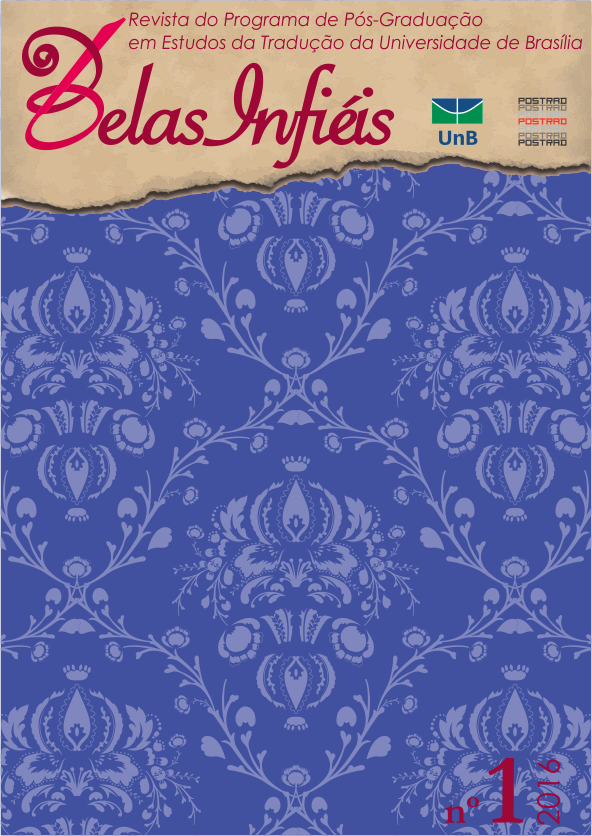A POESIA NAS OBRAS DA ORIGEM:
HAROLDO DE CAMPOS E A TRADUÇÃO DE BERE’SHITH
DOI:
https://doi.org/10.26512/belasinfieis.v5.n1.2016.11377Keywords:
Literatura comparada, Tradução, Transcriação, Haroldo de Campos, GênesisAbstract
O presente artigo se propõe a comentar os resultados obtidos em dois projetos tradutórios distintos, de princípios diversos: a transcriação do primeiro capítulo da Torá ”“ a Bíblia Hebraica ”“ empreendida por Haroldo de Campos, e a tradução de João Ferreira de Almeida, que produziu a primeira versão do texto em português, sendo a variante mais difundida em território nacional. Consideramos suas motivações, o método utilizado e as soluções encontradas ao verter o texto para Português. Procuramos investigar o aspecto literário do texto e discutir conceitos de tradução desenvolvidos por Henri Meschonnic, além de detalhar a teoria tradutória de Haroldo de Campos e a obra em questão, intitulada Bere’shit: A Cena da Origem (CAMPOS, 2000), que respeita a respiração prosódica e a disposição tipográfica da composição, motivada pelo Paideuma concretista ”“ Mallarmé, e.e. cummings, Ezra Pound e James Joyce. Discorremos sobre a amplitude do termo “transcriação” como apresentada por Haroldo para esta obra, que mantém o ritmo da poesia originalmente escrita em hebraico, deixando aparente a abordagem poética do tradutor. Nos propomos a averiguar a reconfiguração (transcriação) do texto original pelo uso de atributos modernistas: verso livre, disposição espacial das palavras, aspectos sonoros e a decomposição de palavras e neologismos. Por último, apresentamos uma comparação didática entre a tradução de Haroldo de Campos e a de João Ferreira de Almeida.
Downloads
References
ALIGHIERI, Dante. Seis cantos do paraíso. Tradução de Haroldo de Campos. São Paulo: Fontana/Instituto Italiano de Cultura, 1976.
ARROJO, Rosemary. Oficina de tradução, a teoria na prática. São Paulo: Ática, 2000.
BÃBLIA. Francês. Bible du Rabbinat. Trad. Jacques Kohn.Paris: Mechon Mamre, 2008.
BÃBLIA. Português. Torá -a lei de Moisés. Trad. Meir Matzliah Melamed. Rio de Janeiro: Sêfer, 2001.
BÃBLIA. Português. A Bíblia de Jerusalém. São Paulo: Paulus, 1981.
BÃBLIA. Português. Bíblia sagrada. Tradução da Vulgata pelo Pe. Matos Soares,1977.
CAMPOS, Augusto de; CAMPOS, Haroldo de; PIGNATARI, Décio. Plano-piloto para poesia concreta. In: Teoriada poesia concreta. Cotia, SP: Ateliê Editorial, 2006.
CAMPOS, Haroldo de.Haicai: homenagem à síntese. In: A arte no horizonte do provável.São Paulo: Perspectiva, 1969.
”“”“”“”“”“”“. Qohélet, O-que-Sabe (Eclesiastes).São Paulo: Perspectiva, 1990.
”“”“”“”“”“”“. Arno Holz: da revolução da lírica à elefantíase do projeto. In: O arco-íris branco: ensaios de literatura e cultura. Rio de janeiro: Imago, 1997.
”“”“”“”“”“”“. Pedra e luz na poesia de Dante.Rio de Janeiro: Imago, 1998.
”“”“”“”“”“”“. Bere’shith: a cena da origem. São Paulo: Perspectiva, 2000.
”“”“”“”“”“”“. Deus e o diabo no Fausto de Goethe. São Paulo: Perspectiva, 2005.
KELLEY, Page H. Hebraico bíblico: uma gramática introdutória. São Leopoldo: Sinodal, 1998.
Yeivin, Israel.Introduction to the tiberian masorah. Atlanta: Scholars Press, 1980.
MESCHONNIC, Henri. Pour la poétique II. Paris: Gallimard, 1973.
”“”“”“”“”“”“.Au commencement :Traduction de la Genèse. Paris: Desclée de Brouwer, 2002.
”“”“”“”“”“”“. Poética do traduzir. Tradução de Jerusa Pires Ferreira e Suely Fenerich. São Paulo: Perspectiva, 2010.
MILLER, Chaim. Chumash: the book of Genesis. New York: Kol Menachem, 2003.
SIMON, Marcel. Verus Israel: étude sur les relations entre chrétiens et juifs dans l'empire romain (135-425). Paris: E. de Boccard, 1964.
Downloads
Published
How to Cite
Issue
Section
License
Given the public access to this journal, the texts are free to use but requires the recognition of the original authorship and initial publication in this journal to be properly stated.
 The journal allows the use of works published for non-commercial purposes, including the right to submit the work to publicly accessible databases. Published contributions are the sole and exclusive responsibility of the author(s).Â



















